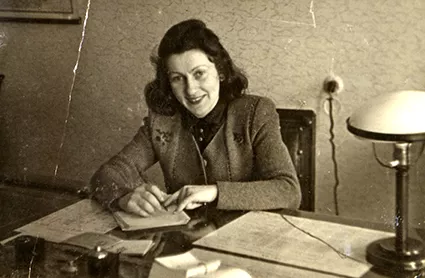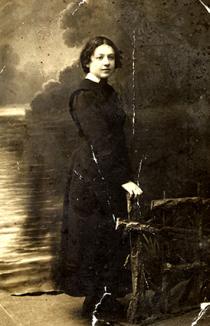Liza Lukinskaya
This picture of me was intended for the occasion of the semi-centennial anniversary of my marriage with Vladimir Lukinskiy. Inscription: ‘To my beloved husband on the semi-centennial anniversary of our family life’ The response was written on a pack of cigarettes: ‘28th of October 1996 is our golden wedding ‘… We had lived to see our golden wedding and had a great celebration in the restaurant. This photo was taken in Vilnius in 1947.
After the war I found a job at the secret department of the Council of Ministers of Lithuanian SSR. The job was very serious. We received top-secret letters and orders and distributed them to different ministries and authorities. I wanted to go on with my education, even chose Vilnius University, but I didn’t manage to study as I was very busy at work. Being employed at a governmental institution I got good product cards- the best products available, even delicacies, while by common food cards only scarce products were given. In the post-war period life was hard and people starved. Soon I was given an apartment - a wonderful two-room apartment in the heart of Vilnius.
There was a Soviet military unit not far from our house. My brother met three officers and invited them to come over to us. One of them, Colonel Vladimir Lukinskiy, a tall handsome man started courting me. I didn’t mind his courtship as I liked Vladimir very much. It wasn’t that I forgot about my husband whom I loved, just being young… Vladimir Lukinskiy was much younger than me. He was Russian, born in Leningrad in 1924. Vladimir came from a rich family. His mother Katerina was from a noble family. She raised her son in a wonderful way. Vladimir was well-read, educated, loved opera and classical music. I found him very interesting. While we were mere friends, my parents treated him very well. Gradually our relationship changed. We fell in love with each other and Vladimir proposed to me. All of a sudden Father opposed to that. He was flatly against my marriage to a non-Jew. He remembered Eduardas and was sorry for not letting me marry him, and again I was dating a non-Jew.
Once in winter 1946 I invited Vladimir for lunch. He brought canned products and firewood. In that period of time it was hard to find supplies. When Father found out that Vladimir made all those presents, he put everything in the garbage can. I told my fiancé the way it was. He reacted calmly to that and invited me to a restaurant. Here he ordered all kinds of delicacies: caviar and ham. Since that time Father started turning out Vladimir, when he came over. Father went on a trip and I decided to have a talk with Mother, woman to woman, and told her about our love. Mother said that I would marry him only ‘over her dead body.’ Then I took my nightie and left home without anything. In spite of the fact that it was my apartment I left everything there, even my food cards, for my mother.
Vladimir and I rented an apartment and moved in there. Once in the evening after work we were passing by my house. Mother was on the threshold and said, ‘Dinner is ready.’ Thus, Mother accepted Vladimir. When Father came back from the trip, Mother told him that I was living with Vladimir. Then Father collected all the presents he had brought me, Mother took linen, table cloth, dishes and they came to see us. Since that time Father and Vladimir became as thick as thieves. My husband never remembered how my parent gave him a hard time at first.
I insisted that Vladimir should be demobilized from the army. I didn’t want to be an officer’s wife and spend all my life on the road. He was demobilized and found a job. Our marriage remained unregistered for a while. The red-tape Soviet laws demanded either the documents on the divorce with Olkin or his death certificate. I didn’t even have the marriage certificate, issued by the Judenrat, as I buried all the documents when leaving the ghetto. I had to walk from one office of a dignitary to another and finally we were permitted to get our marriage registered. It happened in 1946.
In 1948 I gave birth to a son and named him Alexander. For a while my son and I were living with my parents. When our son turned seven months my mother-in-law – my father-in-law had passed away by then – exchanged her apartment in Leningrad for an apartment in Vilnius and we moved in with her. Our apartment was in the heart of Vilnius, consisting of two rooms and a kitchen. One room was taken by my mother-in-law and the other by my husband, son and me. My mother-in-law was a wonderful, clever and kind woman. She accepted me and loved me like her own daughter, helping me in everything, especially in raising our son.





















